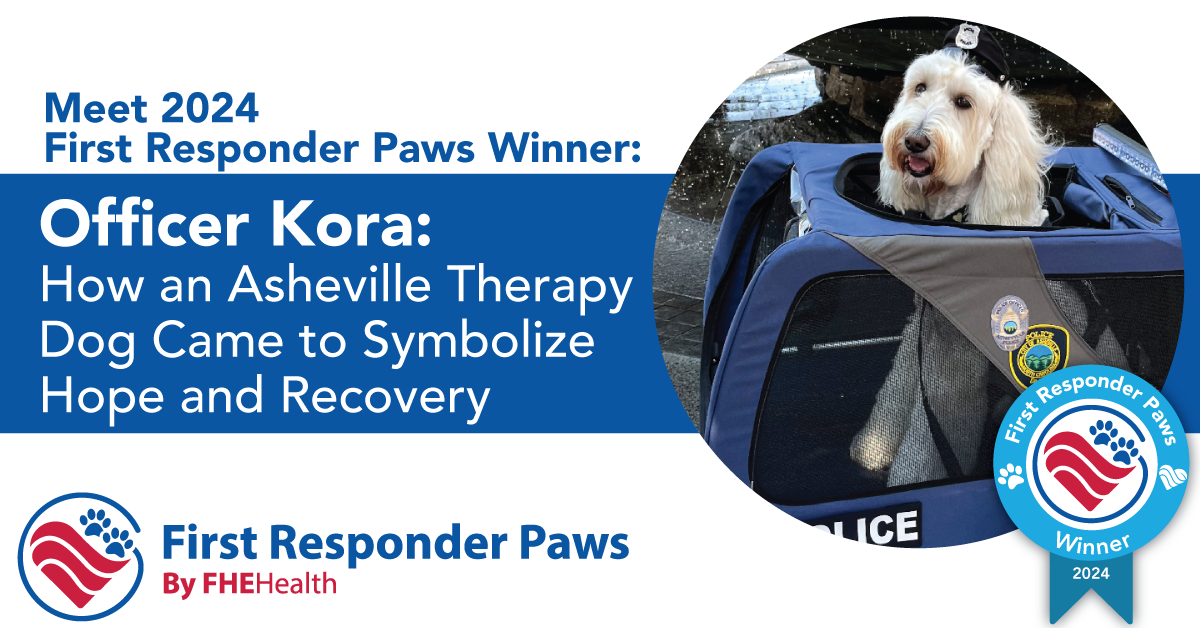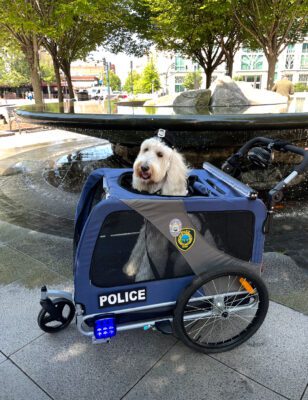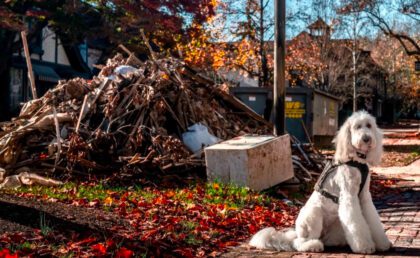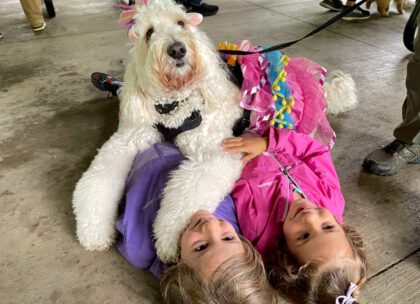
 Last year, a Goldendoodle rescue named “Officer Kora” won the 2024 First Responder Paws Therapy Dog Award. Kora serves the Asheville Police Department, and below you can catch her touching story, including how she and her handler, Senior Police Officer Debbie LeCroy, were part of the relief and recovery efforts after Hurricane Helene.
Last year, a Goldendoodle rescue named “Officer Kora” won the 2024 First Responder Paws Therapy Dog Award. Kora serves the Asheville Police Department, and below you can catch her touching story, including how she and her handler, Senior Police Officer Debbie LeCroy, were part of the relief and recovery efforts after Hurricane Helene.
We recently caught up with the pair for an update: What had they had been up to since winning the First Responder Paws Award?
“Kora has had an amazing and successful year, bringing comfort, joy, and healing to countless individuals through her unwavering presence and gentle spirit,” Officer LeCroy said.
When we asked Officer LeCroy what word best sums up Kora’s contributions and legacy, she said, “If I had to sum up her legacy in one word, it would be healing, because she has an incredible way of bringing calm, comfort, and connection to those experiencing trauma or hardship or really just needing a little puppy love. She’s not just a K-9 for our agency, Officer Kora is a four-legged ambassador of hope.”
For the story that encapsulates Kora’s healing legacy, read on….
Meet the Asheville Police Department’s First Certified Therapy Dog
Life has a way of bringing us to our knees. When that happens, “Officer Kora,” a Goldendoodle rescue, is specially trained to provide “compression therapy.” If someone falls, Kora goes to them and lies on them. The warmth and the weight of her body are calming, “like a weighted blanket with paws,” according to Kora’s handler, Senior Police Officer Debbie LeCroy, who said the intervention is often used for those with anxiety, autism, or sensory disorders. If Kora picks up on signs of stress, she makes her way there to apply gentle pressure, by sweetly sitting on the person’s feet or affectionately leaning into them.
Kora’s name means “heart” in Greek. It seems a fitting designation for a bubbly therapy dog that loves her job. When it’s time to go home after a busy day, she plants her feet at the top of the stairs, as if to negotiate longer hours for no pay, apart from smiles, expressions of appreciation, and a growing accumulation of toys. (These form a haphazard trail from the entrance of the department to the office of the police chief.)
Kora is the Asheville Police Department’s first certified therapy dog. She began this work when she was still a puppy, after eight months of training with the organization Highland Canine, in Harmony, North Carolina. This was followed by certification with the United States Police Canine Association (USPCA Region ll NC, SC, and GA).
From a Rescue Litter to “Paw-Trolling” Asheville

Kora first met Officer LeCroy when LeCroy was exploring the prospect of a therapy dog for Asheville officers. (At the time, she had not yet gotten official approval for a therapy dog.)
“I had a passion to bring a therapy pup to our agency to assist first responders in reducing the stress and anxiety of our jobs and to help us cope with what we see and deal with daily,” Officer LeCroy said.
LeCroy found out about Kora’s rescue litter by word of mouth and asked the owner of Highland Canine to help her pick out a pup that might be trained as a therapy dog. The owner chose three from the litter that had potential. One of them was Kora.
LeCroy received regular updates about the pups’ progress in the months that followed; and, with time, Kora’s giftedness revealed itself to her trainers, who gave glowing reports of her intelligence, obedience, and extremely loving nature. LeCroy was persuaded.
More than three years later, Kora has become an integral part of the Asheville Police Department and its efforts to build positive relationships with the community. She “paw-trols” downtown Asheville in her own specially donated paw-trol cart and participates in school and youth programs and other community events, often in one of her many colorful and flamboyant outfits.
At police headquarters and in the field, Kora provides emotional support to officers and first responders, comforts victims of crime and bereaved family members, and responds to crises. She also assists in critical incident stress debriefings. These facilitator-led meetings allow officers to process traumatic calls. In one especially hard debriefing earlier this year, officers were discussing the double homicide of two children. Kora made a beeline for a leading detective in the case and sat on his feet throughout the meeting.
Life in the Aftermath of Helene

Kora goes to work with LeCroy every day, but on the morning after Hurricane Helene, LeCroy left Kora at home with friends to keep her safe. LeCroy later recalled walking out her door that Friday not knowing if she would be coming home.
That day, and for the next few days, Kora stayed home while LeCroy responded round-the-clock to emergency calls and frantic requests from families looking for their loved ones. The scenes of death and destruction were other-worldly: downed trees everywhere — 40 percent of the area’s trees were lost, LeCroy said; vehicles and even whole houses floating downstream with people in them; businesses and art collections washed away; and many lives lost, making Helene the deadliest tropical storm in the history of North Carolina.
At night, LeCroy would come home to Kora after a grueling day and fall into bed but could not sleep. She’d try to close her eyes, but those scenes of destruction kept her awake, playing over and over like a movie reel. At these times, Kora would lie on top of LeCroy and administer compression therapy.
Within several days, “when it was safe to bring her,” Kora was back on the job with LeCroy. The pair worked 15 to 16-hour days, supporting first responders as they worked round-the-clock to save lives, reunite families, and recover and rebuild. While LeCroy organized the feeding of personnel from her agency — and the more than 600 police officers from across the U.S. and Canada who joined in the relief efforts — Kora comforted those in need.
“All of us were seeing and dealing with things that we have never dealt with before,” LeCroy said, describing what it was like to be on the frontlines of Helene as a first responder. “Kora in her special ways has a calming presence, which takes your mind off the many stressors that we are dealing with in this profession.”
Kora made visits to the Red Cross Headquarters, Emergency Operations Center, shelters set up across the city and county, the very few businesses that were open, and fire departments. She also made house calls in the community. And it soon became clear that Kora’s services were in high demand.
“Kora was getting so many requests that I had to call in her furry friends from Highland Canine,” LeCroy said.
Lessons in Resilience from a Therapy Dog

Today, the work to recover and rebuild after Helene continues.
“Now more than ever people need support,” LeCroy said. “We are all expected to return to our previous level of functioning, yet we are all trying to deal with trees on our homes, flooding, death, recovery efforts, and exhaustion from extended work hours.”
“Children feel frightened and confused,” LeCroy continued. “I have taken Kora into multiple schools, and I have teachers ask me, ‘How does she know that child needed her the most?’
Kora intuitively knows when someone needs her.”
At a recent eye appointment, LeCroy bumped into a lady who asked if she could pet Kora: “The lady knelt and began weeping with her arms around Kora. I spent about 30 minutes speaking with her about the overwhelming loss of her home.”
Through these and countless other interactions, Kora has come to be “more than just a therapy dog,” according to LeCroy, but “a symbol of hope, compassion, and resilience.”
In January, Kora will turn four. Because of her impact, Asheville Police Department has acquired a second therapy dog, Hope, and is considering a third.
Earlier this month, Kora passed her second USPCA certification “with flying colors.”
“There was a recall portion of the test, and Kora walked over and sat on the judge’s feet.
He laughed and admitted it was a stressful time,” LeCroy said.
If Kora could talk, what message would she share with our readers? we asked LeCroy.
“It is ok to not be ok. Lean on others around you. I, along with others throughout our wonderful community will be here ‘fur’ you.”
It’s ok to not be ok. If you’re struggling, we’re here to help. Contact us anytime.






